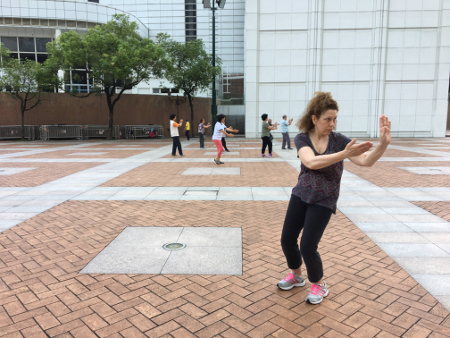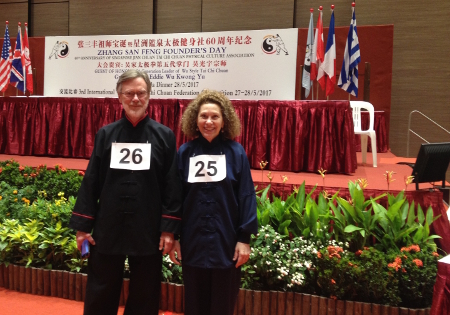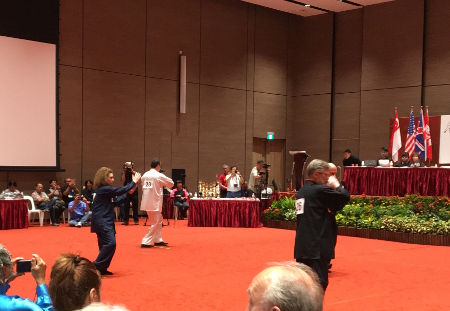
During the work week, Deirdre Moore spends her days at the W.E. Upjohn M.D. Campus helping students navigate the complexities of financial aid for medical school.
But when the weekend comes Moore, WMed's Director of Financial Aid, makes the drive from Kalamazoo to her home in Dearborn where she immerses herself in Wu Style Tai Chi Chuan, an ancient martial art that, for Moore, has become a passion – and a pathway to a healthier life – over the past 13 years.
“I was looking for something to help with stress management,” Moore said of taking up tai chi in 2004. “Tai chi is described as meditation in motion, it promotes focus and it has a meditative aspect to it, in addition to being good for managing stress, blood pressure, breathing and circulation.
“There are all kinds of benefits to it.”
While the health benefits of tai chi are unquestionable for Moore, her decision to pursue the martial art and become a certified Wu Style Tai Chi instructor has opened doors for her, including the opportunity in May and June to compete in the Wu Style Tai Chi Chuan tournament in Singapore and take part in celebrations of the 80th anniversary of Wu Style Tai Chi in Hong Kong and the 60th anniversary of the Jien Chuan Tai Chi Chuan Physical Culture Association in Singapore along with Wu stylists from all over the world.
During the competition in Singapore, Moore competed in the 54-form of Wu Style on May 27. The 54-form, which encompasses a sequence of 54 continuous tai chi movements, was among several events held during the competition at a large convention center in Singapore.

While it was daunting to compete with the finest tai chi practitioners in the world, Moore expressed her appreciation and gratitude for the founders of Wu Style Tai Chi, as well as the current Grandmaster, Eddie Wu Kwong Yu.
“I think the best thing about competition is that you spend a lot of time training seriously,” Moore said. “It gives you great motivation to improve as much as you can before a competition … I think it challenges you to do your best tai chi and you get the appreciation of seeing other people who are world champions. There’s really a supportive network of practitioners and instructors.”
Moore said tai chi helps her manage day-to-day stress and when she first gave the martial art a try in 2004 she was looking for a physical activity that would provide her relief from chronic back pain caused by injuries she suffered in a car crash.
Lucky for her, Moore said she began her journey into tai chi with an excellent instructor, Sifu Genie Parker, who runs the Wu Style Tai Chi Chuan Academy in Ann Arbor and is a disciple of Grandmaster Eddie Wu Kwong Yu.
On the weekends, Moore assists Parker in teaching tai chi at the University of Michigan-Dearborn. Classes are also held there on Tuesdays.

Moore said the popularity of tai chi is on the rise and it has proven to be beneficial for many individuals, including senior citizens with arthritis. The Saturday classes in Dearborn, which typically draw 20 to 25 people, have included attendees with diabetes and chronic pain. Parker also teaches sitting tai chi classes for people dealing with diseases such as multiple sclerosis and Parkinson’s disease.
At WMed, Moore has done tai chi workshops for students as part of the medical school’s wellness elective and she said she would be interested in starting a tai chi class at the W.E. Upjohn M.D. Campus.
“I got into tai chi for the health benefits,” Moore said. “It’s called a soft martial art because it’s internal. You’re generating internal energy and you’re using physics as a way to drive movement. The saying in tai chi is ‘If you don’t move, I don’t move. If you move, I move faster.’”
As she looks to the future, Moore said she will go back to Singapore and Hong Kong to compete again. “It’s motivating to see I’ve got higher levels to achieve,” she said. “Tai chi really is a lifelong commitment if you want it to be. It’s a continual improvement process and you’re never done learning.
“Like any art form, you’re never done mastering your craft.”
